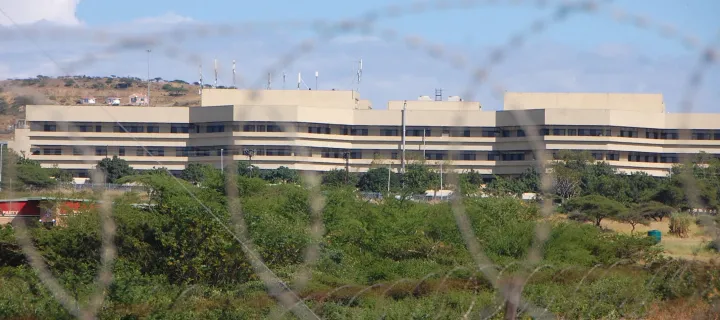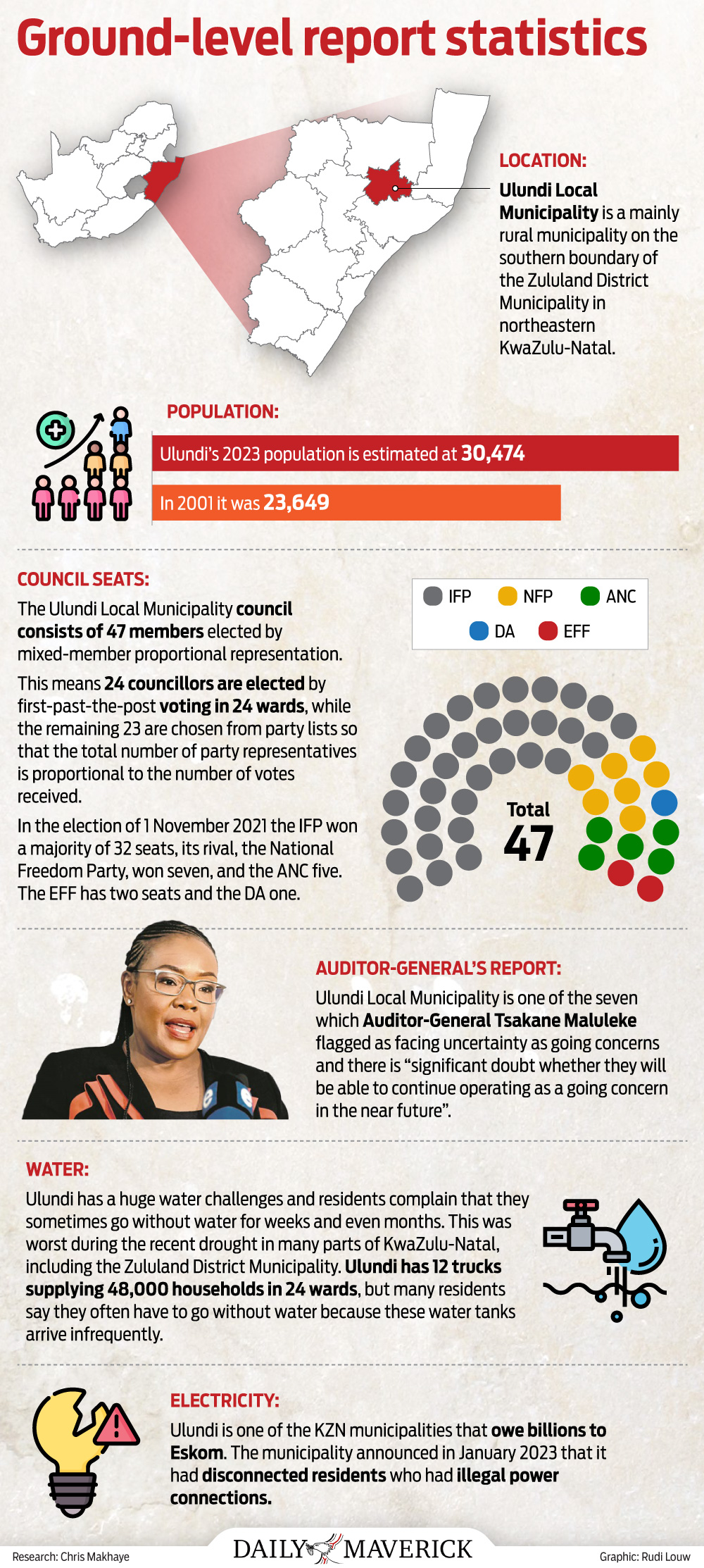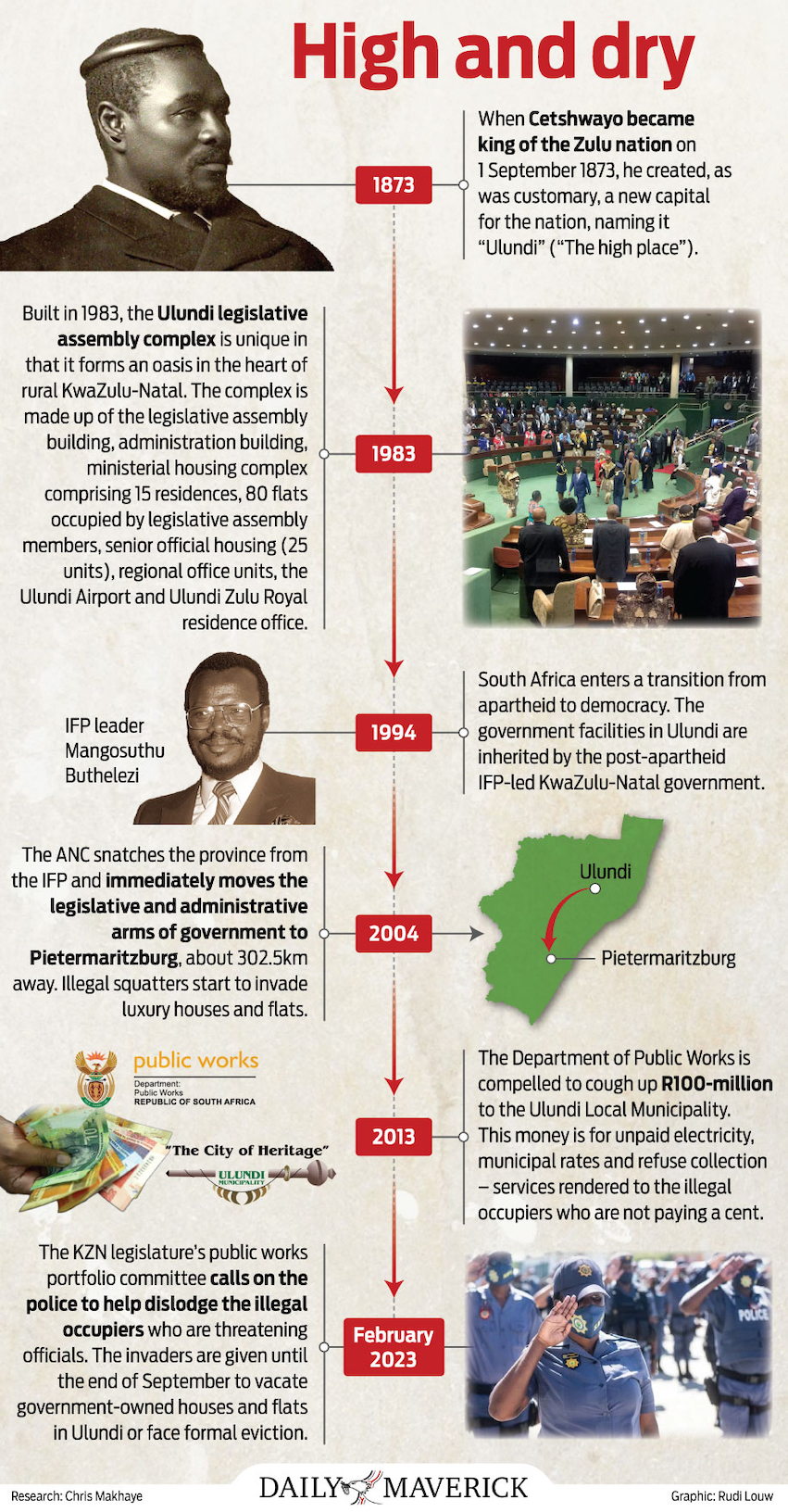THE HIGH PLACE, PART THREE
‘Here they get whipped’ – this is life on the street for Ulundi’s ‘amaphara’

In Ulundi, amaphara (vagrants) are not tolerated. Hawkers, metered-taxi operators, shopkeepers and other locals say the homeless are a nuisance to be hounded out of town by private security guards. NGOs, on the other hand, say people living on the street are turned into scapegoats for society’s problems.
It’s government pension and grant payout day in Ulundi and masses of people, when everyone from the elderly to mothers collecting the child support grant to those relying on the R350 Social Relief of Distress Grant descend on the small northern KwaZulu-Natal town.
Pandemonium breaks out and hawkers are pulled away and scurry for cover as a young man passes them at full speed, pursued by armed security guards and a dark-tinted 4×4 bakkie. The guards chasing him are wearing linen masks, some have balaclavas.
The man on the run is too fast and he vanishes int0 the crowd and into oblivion. But the guards are unphased. They give up the chase but grab another shabbily dressed young man. Some of them ask him if he didn’t get the message that amaphara (vagrants) are not welcome or wanted in Ulundi (the “High Place”).
All of this is happening just outside the King Senzangakhona Mall, which made headlines during the July 2021 riots when IFP supporters guarded the town against looting. It was one of the few towns in KZN untouched by the riots.
If you are a phara in Ulundi you have to go elsewhere to practise your vagrancy, not here.
The guards grab the hapless man by the back of his pants and haul him away from the prying eyes and around the corner. What happened to him there is anyone’s guess.
Hawkers, metered-taxi operators, shopkeepers and townspeople alike confirmed that in Ulundi vagrants or loitering homeless people are not welcome and they are tackled by private security – employed by both the Ulundi Local Municipality and private businesses – taxi owners and even hawkers.
Although the municipality does not admit it in public, it appears to be common knowledge that the security guards pestering, assaulting and chasing away the homeless are doing so at the instigation of the municipality “to keep the town clean and crime-free”.
Peter Khumalo (38), a metered-taxi owner, is one of the people who witnessed this incident. He, like many other people in the town, said the guards were right to chase away vagrants.
He said vagrants, which he referred to as pharas, were a big nuisance in the town before they were forcefully ordered to “leave”. He said that apart from committing petty crime they sometimes forced grant recipients to pay them R100 to get into the queue for the pay point.
“Imagine you are coming to receive the R350 grant and now you have to pay iphara R100 to get into the queue. Many people just pay them because if they don’t, they will go home empty handed. There are so many other things they are involved in. So, the best way is for them to move away from here,” he said.
Other townspeople said many local vagrants had fled and sought asylum in less-hostile towns to avoid being assaulted or even killed.
“We don’t want pharas here in Ulundi,” said one female hawker. “Here they get whipped. If you are a phara in Ulundi you have to go elsewhere to practise your vagrancy, not here.”
Read Part One: Ulundi squatters who hijacked state-owned houses 20 years ago given an ultimatum: move out or else
Read Part Two: The capital question – returning power to Ulundi lights a fire under electoral battle
The Ulundi Local Municipality which is one of five municipalities under the Zululand District Municipality – one of South Africa’s poorest regions.
According to the 2016 Community Survey, the Zululand District had 448,330 working-age people (between the ages of 15 and 64), 57% of whom were unemployed, while only 19% of the local population was formally employed.

More than 72,000 people in the district had no schooling at all and 61,000 had some form of primary education, 16,687 had completed primary school, 104,000 had finished high school and only 20,150 had studied and passed at tertiary level. Sixteen percent of the local population earned between R1 and R4,800.
About 78% of the local households had access to electricity. But the local municipality recently announced that only 20% of electricity users are paying for power. The municipality owes more than R100-million to Eskom and is struggling to pay the debt, so it has now embarked on an initiative to disconnect all those with illegal connections.
Only 64.4% of households had access to safe drinking water and only 14.7% had flush toilets.
Unemployment among young people in the Zululand District Municipality stood at 51.2%, which was higher than the provincial average of 42.1%.
Widespread hostility
Ulundi is not the only town hostile to the homeless. Vryheid, which is about 121km away, is also for this, as is Port Shepstone, according to its residents, who say that, as a result, there are very few homeless people there.
The amaphara are a fairly new phenomenon in South Africa. In the Durban city precinct alone their numbers range from 6,000 to more than 10,000, depending on who you ask – NGOs or local authorities.
Read more in Daily Maverick: 70% expenditure failure in KZN municipalities depicts ‘culture of tolerance for transgressions’ – and that’s before the floods and riots
Local people said that before the unofficial crackdown against the homeless there were dozens of them roaming the town, sleeping in the town or on its outskirts.
There is a lack of consensus on the total number of people living on the street in South Africa. The Human Sciences Research Council (HSRC) estimates between 100,000 and 200,000. Many sceptics say the number has increased to more than one million over the past few years.
Some are orphans who ended up on the street after losing their parents and other family to HIV and Aids. Some are drug addicts and some are foreigners who came to the city in search of work and other opportunities but soon found themselves in financial desperation.
Some have formed a kind of brotherhood, relishing the ultimate freedom of life with no responsibilities. Many others have been cast out by their families and communities, and who now rob in broad daylight, grabbing bags, the weaves from women’s heads, wallets, phones and other accessories, then vanish into abandoned buildings or or dark railway tunnels.
There are very few homeless people who say they want to live on the street for the rest of their lives.
Monique Marks heads up the Urban Futures Centre at the Durban University of Technology and has done extensive studies and reports on Durban’s homeless population over the years. She said very few of the homeless are petty criminals and many other ordinary people trying to eke out a living in trying circumstances.
She said the hostility towards the homeless and vagrants is steadily increasing, among rich and the poor communities.
“This is not happening in Ulundi. The hostility towards homeless people is everywhere. You find it in the cities and towns, you find it in the suburbs and in the township and rural areas. The suburbs are constantly cleaning up and getting rid of homeless people. That you don’t find homeless people in the suburbs is not because there live nicer people, it’s just that there they are effective in ejecting poor and homeless people.
Marks adds: “Government needs to be instructing its professionals and officials about treating homeless people with dignity and care – not to treat them as subhuman. Both the South African Police Service and the Metro Police need to be sensitised around what it means to be homeless. They need to understand that being homeless is another form of living. Home for homeless people is the street.”
Nevertheless, she adds, the government should work to give homeless people access to homes, so they can have shelter.
“There are very few homeless people who say they want to live on the street for the rest of their lives,” she said.
Treated like ‘subhumans’
Raymond Perrier, head of the Denis Hurley Centre, a Durban city centre-based Roman Catholic Church NGO that feeds thousands of homeless people daily and also offers drug addicts care and education, among other things.
The centre’s Nkosinathi Project for the Homeless offers a range of services including showers and clean clothes as well as a free clinic to help those affected by HIV, Aids and drug-resistant TB.
Perrier said using security guards to “get rid” of the homeless is a widespread strategy in towns and cities throughout South Africa. “This comes from the general feeling among communities that homeless are subhumans who do not deserve to be treated with dignity and human rights. Incidents within the (Durban) city happen where the Metro Police, the SAPS and private security officers would say they are doing a clean-up and a clean-up literally means taking homeless people off the street. We have had many of those incidents and we have had to intervene.”
Perrier said that during a summit with government officials and civil society organisations, the former started complaining about the homeless.
“I immediately stood up and told them they will have to change their language and attitude when it comes to homeless people. We call them homeless citizens. Homeless people are made into scapegoats for many things that are going wrong in our society and officials and security forces target the defenceless homeless people in order to be seen to be doing something,” he said, adding that the whole country needs to change in the way it views homeless people and issues around homelessness.

Wilson Ntshangase, a prominent IFP leader and mayor of the Ulundi Local Municipality, denied that his town is on the mission to chase away homeless people.
“The problem of the homeless is a competency of the Department of Social Welfare and Development. We, as the municipalities, have very little resources to deal with this matter. There is no special grant we get from the national government to deal with the problems of the homeless and the pharas. So, when there are problems there are structures that deal with lawlessness and they normally do their best under the circumstances,” he said. DM


















This excellent article illustrates that the IFP is little better than the ANC.
They are the best of a very bad bunch!